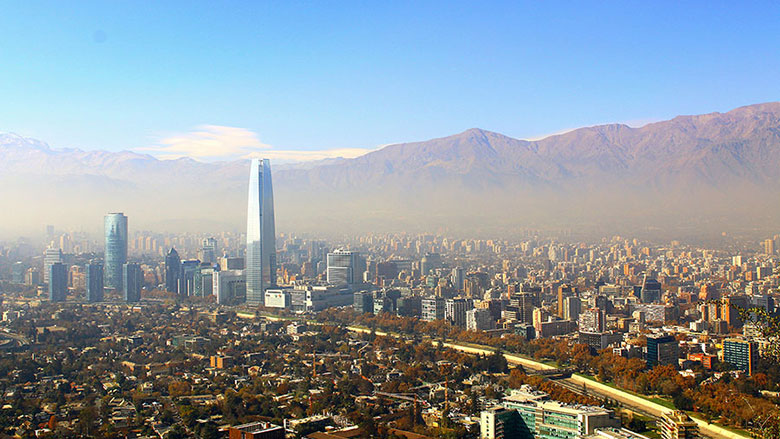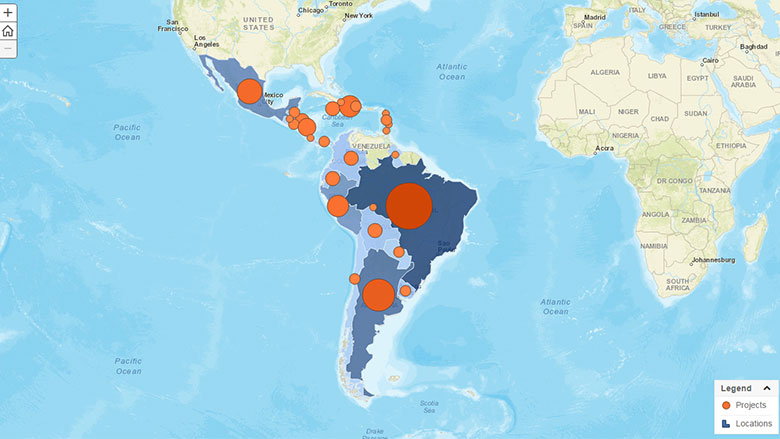Challenge
Chile is a high income country with one of the most politically stable systems in Latin America with strong institutions and a solid record of economic growth during the last two and a half decades. The success of Chile’s economy can be attributed to continuity in sound macro policies, an open trade regime, and a business-friendly environment. Measured at US$4 a day, moderate poverty dropped from 20.6 percent to 6.8 percent between 2003 and 2013. Shared prosperity also improved: between 2003 and 2011 the mean income of the bottom 40 percent expanded by 4.9 percent, higher than the overall income growth of 3.3 percent.
Efforts have focused on improving equity, however, Chile faced three key challenges: declining growth performance, high inequality, and natural disasters. GDP only grew 2.1 percent in 2015, slightly above the 1.9 percent reached a year before, as a result of the slowdown in the mining sector from the decline in copper prices and private consumption. Chile’s per capita income still falls short of that of higher-income countries (in 2014, the per capita income of US$ 21,980 was still far below the average of US$ 41,035 for OECD countries) and although income inequality has declined, Chile remains among the most unequal countries in the OECD. According to the Ministry of Social Development, CASEN 2013 data indicates that inequality remained stagnant between 2011 and 2013 and is only slightly lower than 2006 and 2009. In addition, Chile is prone to natural disasters as it is located in a highly seismic area and exposed to common threats such as floods, extreme temperatures, earthquakes and tsunamis.
Approach
In order to support the government’s vision to reduce inequalities by 2018 and ensure the long term environmental sustainability of growth, the World Bank Group (WBG) supported a flexible program to respond to a sophisticated client that demands just in time assistance, mostly in knowledge intensive areas. The WBG's partnership with Chile is a good example of knowledge exchange with an advanced country that has achieved OECD membership. The WBG mobilized global experts to help the Government shape reforms in different areas, particularly through the Joint Studies Program, and Chile has become one of the top knowledge providers for Bank members.
The WBG supported the government’s efforts to improve equity by increasing access to, and quality of, education, social protection, and health services. Additionally, the WBG supported public sector modernization efforts focused on improved performance and public financial management, transparency and accountability of public institutions, the monitoring and evaluation institutional capacity, and the efficient use of receding public resources. Finally, in order to promote sustainable investments the WBG and the Government jointly worked on strengthening regulations on the use of natural resources, particularly in water, managing infrastructure, and the agro-food industry.
Results
World Bank financing helped achieve the following results from fiscal year 2011 to fiscal year 2016.
- Chile has utilized results-based financing in the education sector aimed at improving the quality and performance of higher education through student-focused performance agreements with institutions. As of today, more than 50 percent of students in technical and professional degrees benefit from a redesigned curricula; retention rates have increased: today, 74 percent of first year undergraduate students remain at the institution in the second year; and the number of full-time-equivalent faculty members who hold PhDs has increased from 5109 in 2011 to 7883 in March 2016. Additionally, the knowledge program informed key changes in legislation to improve the accreditation quality assurance system and the accountability of institutions, based on experiences from OECD countries.
- At the government’s request, the Bank conducted an assessment of the distributional effects of the 2014 tax reform on the economy, particularly on income inequality, by quantifying the potential effects of the reform on the country’s income distribution profile. The report revealed that the Tax Reform had a broad impact on equity. Taxes paid by the richest one percent of the population increased from 2.4 percent to 3.5 percent of GDP.
- One hundred municipalities fully implemented a financial management system and improved quality and timeliness of information. Over 45 regional plans were designed, financing 250 infrastructure projects (roads, water and sanitation, energy, and ICT) and mobilizing funds to support 27 productive activities. About 320,000 people benefited from improved infrastructure and territorial planning and implementation of inclusive development programs.
- At the central level, a new public financial management system (SIGFE II) was implemented by 86 institutions as of June 2014. Implementation was financed by the WBG through the Chile Road Map for the Modernization of Human Resources Management in the Public Sector and a grant from the Institutional Development Fund, Chile: Strengthening Public Senior Executive Service.
- The government transformed the Planning Ministry into the Ministry of Social Development and enhanced the Social Protection Index to improve coverage of the Social Protection System programs, including the flagship program Chile Crece Contigo. This program monitors the development of and provides services to children up to 7 years old and their families nationwide. The Bank also supported the design of the psychosocial support and employment counseling provided by the Family Ethical Income program. Finally, the Bank provided continuous support to inform the creation and management of the National System for Social Care, improving the quality of existing services, maximizing efficiency of the supply, and selecting the most vulnerable households based on level or grade of dependency. As a result, social protection services are expected to be delivered to 12 percent of Chilean households, which according to the national survey (CASEN 2013), have at least one vulnerable person (including young children, elderly and persons with disabilities)
- The knowledge program informed key institutional changes and policy making processes in the areas of public works, transport, urban mobility and innovation in Santiago and Concepcion, sustainable and efficient management of natural resources, and the institutional plan and strategy for the Water Reform led by the Water Directorate.
- The Bank is also contributing to Chile’s efforts to mitigate global climate change through certified carbon emission reductions linked to hydropower projects (Chile Quilleco Hydropower Project, Chile - Chacabuquito Hydro Power Project, CHILE Hornitos Project (Chacabuquito II)), and by implementing several grants aimed at developing and implementing instruments for carbon pricing and green growth. The Bank is also supporting the Ministry of Energy to prepare its Market Readiness Proposal (MRP), a national forestry and climate change strategy.



